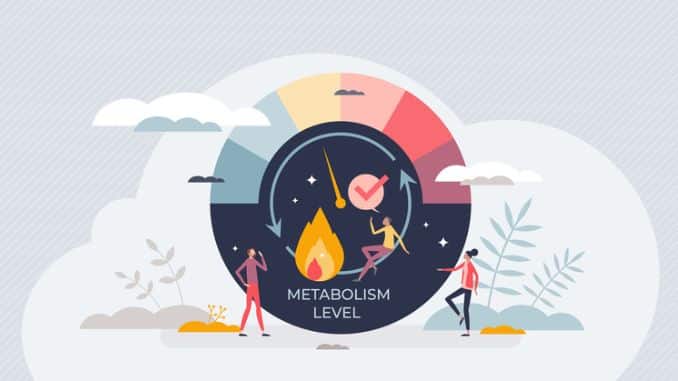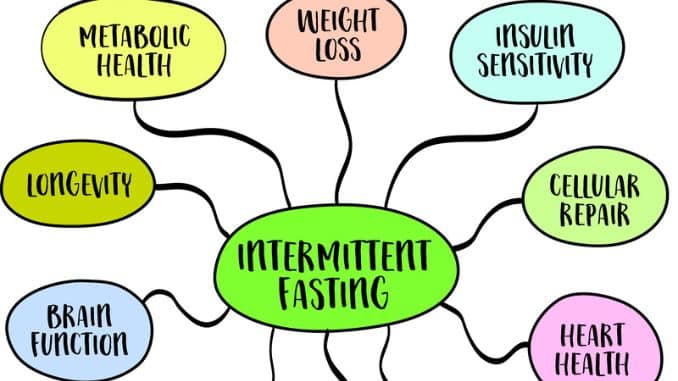Intermittent fasting (IF) has gained popularity in recent years as a dietary approach [1] for weight loss and improved metabolic health by enhancing intermittent fasting metabolism. Therefore, this eating pattern alternates between fasting periods and eating windows, aiming to improve insulin sensitivity, boost metabolism, and support overall well-being.
Many individuals turn to intermittent fasting to help reduce calorie intake, simplify their eating habits, and promote weight loss. In addition to reducing body fat, it has also shown promise in supporting metabolic health.
What Is Intermittent Fasting?

A dietary approach that alternates between fasting and eating periods, aiming to improve metabolic health and aid in weight management. Common variants include Intermittent Energy Restriction (IER) and Time-Restricted Feeding (TRF).
Intermittent fasting involves restricting food intake for certain periods, which can range from 12 hours to several days. There are various methods of intermittent fasting [2], including time-restricted eating, alternate-day fasting, and prolonged fasting.
- 16/8 Method: Fast for 16 hours and eat during an 8-hour window. For example, eat between noon and 8 PM and fast from 8 PM to noon the next day.
- 5:2 Method: Eat normally for 5 days of the week, and restrict calorie intake to about 500-600 calories on 2 non-consecutive days.
- Eat-Stop-Eat: Involves fasting for a full 24 hours once or twice a week. For example, fast from dinner to dinner or lunch to lunch.
“Intermittent fasting can benefit some individuals, improving bowel health, inflammation, blood pressure, and cholesterol, especially when paired with a healthy diet. However, it’s not suitable for everyone, including children and pregnant women.
Before making any dietary changes, it’s important to consult a healthcare practitioner to ensure it meets personal needs and includes necessary nutrients during fasting periods. Active individuals, like runners, should carefully evaluate fasting on exercise days to avoid potential risks.” – Felicitas Bouche Ocampo
Does Intermittent Fasting Slow Down Metabolism?

Intermittent fasting does not slow down metabolism. In fact, it can have several positive effects on metabolic health. During fasting periods, the body shifts to burning fat for energy, which helps promote fat loss and improves insulin sensitivity. Additionally, intermittent fasting can enhance fat metabolism, reduce harmful fat stored in organs (ectopic fat), and reduce visceral fat around internal organs, all of which contribute to better overall metabolic health.
However, it’s important to note that proper nutrition is essential during eating windows to avoid any potential negative effects, such as muscle loss, which could slow metabolism. When done correctly, intermittent fasting can actually boost metabolism by increasing the body’s ability to process fatty acids and use fat for energy.
Effects On Metabolism
Here are the effects of Intermittent Fasting on our metabolism:
- Glucose and Insulin Sensitivity: Intermittent fasting, particularly intermittent energy restriction (IER), improves blood sugar control and makes insulin more effective, benefitting weight loss efforts.
- Fat Metabolism: IER can reduce harmful fat, like ectopic fat (fat stored in organs), and enhance the body’s ability to process fatty acids, which promotes body fat loss and improves metabolic health.
- Fat Burning: During the fasting period, the body uses fat for energy instead of food, leading to fat loss and better insulin sensitivity.
- Fat Tissue Changes: Intermittent fasting can reduce harmful visceral fat around organs and improve fat cell function, helping prevent or manage conditions like insulin resistance.
Benefits Of Intermittent Fasting.

- Promotes weight loss and improves insulin sensitivity.
“Intermittent fasting (IF) is a diet that cycles between periods of eating and fasting. There are many different ways to do IF, but the most common is to fast for 16 hours and eat during an 8-hour window. It can be a good way to lose weight while staying active and not eating after 8pm. When you fast, your body goes into a state of ketosis, where it burns fat for energy. This can help you lose weight and improve your health. ” – Dr. Tribhushan V. Rambhatla
- Reduces inflammation and supports cardiovascular health.
- Increases human growth hormone, aiding muscle mass gain.
- Enhances mental clarity and lowers the risk of chronic diseases like type 2 diabetes and certain cancers.
1. Cardiovascular Health Benefits
Intermittent fasting can have several positive effects on heart and metabolic health: (2)
- Lower Blood Pressure: Helps reduce systolic and diastolic blood pressure, particularly in those with high blood pressure.
- Improved Cholesterol Levels: Methods like alternate-day fasting and the 5:2 diet, for example, can significantly reduce LDL cholesterol and triglyceride levels.
- Reduced Oxidative Stress: Fasting lowers oxidative stress, which in turn reduces inflammation and consequently contributes to better heart health.
2. Potential Cons Of Intermittent Fasting
- Not suitable for those with eating disorders.
- Can cause nutrient deficiencies if not properly planned.
- Difficult to maintain in social situations.
- May result in negative energy bdigestalance.
- Could lead to fatigue and irritability.
- Potential for overeating during feeding periods.
- May affect hormonal balance in some individuals.
3. Is Intermittent Fasting Right For You?
Intermittent fasting can be effective for weight loss, improving muscle mass, and managing metabolic health. However, it may not suit everyone, particularly individuals with specific health conditions. Always consult with a healthcare provider before starting a new fasting for weight loss regimen.
- Firstly, start with a gentle fasting approach, such as 12-hour fasting, and gradually extend the fasting period.
- And then, stay hydrated during fasting periods.
- Plan meals to ensure proper nutrition during eating windows.
- After that, avoid overeating during the eating window.
- Lastly, listen to your body and adjust the schedule as needed.
4. Common Mistakes To Avoid
- Not staying hydrated during fasting periods.
- Overeating during eating periods.
- Failing to plan meals in advance.
- Not consulting a healthcare professional before starting intermittent fasting.
Conclusion
Intermittent fasting (IF) is a popular approach for weight loss and improving metabolic health. It helps with insulin sensitivity, fat burning, and cardiovascular health. Methods like the 16/8 and 5:2 diets offer flexible options for those aiming to manage body fat and improve well-being.
However, intermittent fasting (IF) may not be suitable for everyone. For instance, it can cause nutrient deficiencies, pose challenges for social settings, and may lead to fatigue or overeating. Therefore, it is essential to consult a healthcare provider before starting, especially as IF may not be appropriate for people with specific health issues. On the other hand, with proper planning, IF can effectively support weight loss and overall health.
Discover the simple, effective strategies to boost your metabolism, burn calories, and feel energized every day. The 14-Day Metabolism Booster Quick Start Program gives you step-by-step guidance to kickstart your journey to a healthier, more vibrant you.
Frequently Asked Questions
Does intermittent fasting increase or decrease your metabolism?
Intermittent fasting may have a slight boost on metabolism during the fasting period due to an increase in norepinephrine and human growth hormone. However, over time, metabolism may stabilize depending on the individual’s overall health, diet, and lifestyle.
How long do I need to fast to reset my metabolism?
There isn’t a specific time frame for “resetting” metabolism. Short-term fasting can improve insulin sensitivity, but the body’s metabolism doesn’t typically reset in the way many think. It’s a gradual process influenced by diet and activity levels.
Is it better to fast 12 or 16 hours?
Both 12-hour and 16-hour fasts can be effective. A 12-hour fast might be easier to maintain and still offer some benefits, while a 16-hour fast can lead to more significant results in terms of fat loss and metabolic health, but it may require more adaptation.
Does your metabolism slow down when cutting?
When cutting calories for weight loss, metabolism can slow slightly over time as the body adjusts to lower energy intake. This is a normal response, and the degree of slowdown can depend on the extent of the calorie deficit and the individual’s activity level.


